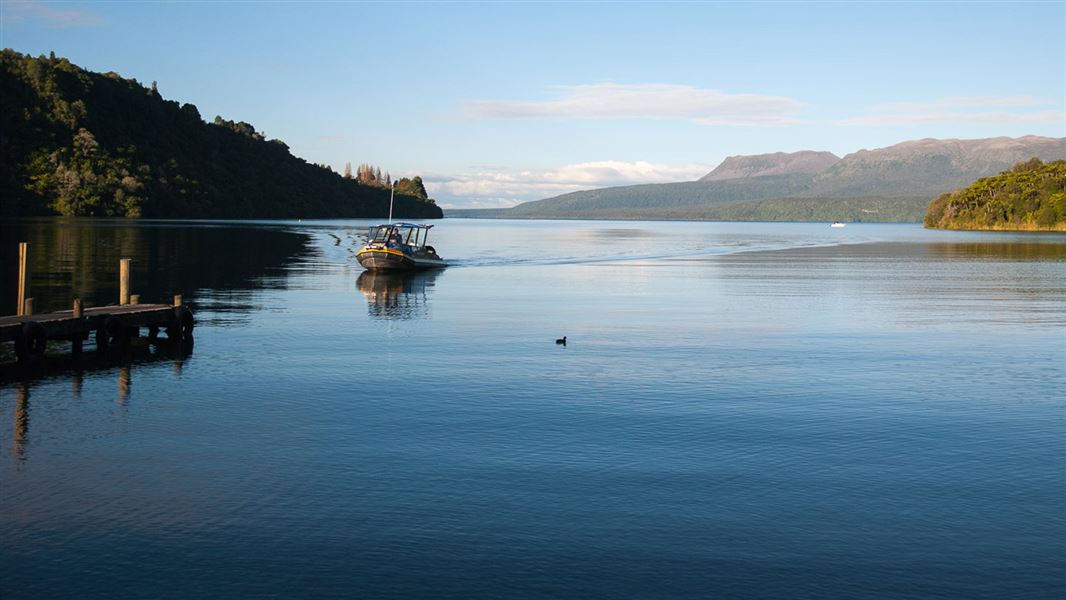Archived content: This media release was accurate on the date of publication.
Date: 16 July 2020 Source: Office of the Minister of Conservation
I'm delighted to announce that Rotorua iwi entity Te Arawa Lakes Trust will receive $2.5 million from the Government’s Jobs for Nature fund to lead an ambitious environmental programme - Mauri Tu Mauri Ora Te Arawa - that will also create 40 nature-based jobs for those impacted by Covid-19, particularly in the tourism, hospitality and services sectors,” said Eugenie Sage.
The project will see wetland restoration, catfish and aquatic weed control, pest eradication, monitoring water takes and discharges, and beehive management work take place across Te Arawa’s rohe, creating nature-based jobs which improve the health of the whenua land and freshwater.
Covid-19 has severely impacted tourism in the district and about a third of the workforce Te Arawa employs through its commercial ventures. This funding will provide relief and create jobs, while benefiting nature,” said Eugenie Sage.
Funding for the project comes from the more than $500 million allocated to the Department of Conservation (DOC) as part of the Government’s $1.3 billion Jobs for Nature investment in response to Covid-19, and was announced today at an event at Rotorua’s Tamatekapua Marae.
At the event Eugenie Sage also outlined the significant new investment in biosecurity and biodiversity work that Land Information New Zealand (LINZ) can achieve as a result of the Covid-19 recovery and Budget 2020 package.
This funding effectively triples LINZ’s biosecurity budget to $70 million over four years. It includes $40 million over four years for LINZ’s national biosecurity programme, plus nearly $6.9 million over four years toward the agency’s land-based biosecurity programme” said Eugenie Sage.
The new funding builds on a doubling of LINZ’s aquatic biosecurity budget in 2019/20 which has enabled LINZ and its partners to increase control of aquatic weeds.
In the Te Arawa lakes the extra funding means LINZ has been able to ramp up an existing programme underway at the southern end of Lake Ōkataina targeting the aquatic weeds Hornwort, Egeria and Lagarosiphon.
“These investments are a win-win for jobs and the mauri of lakes, wetlands and forests in the Te Arawa rohe.
LINZ and DOC are working closely with the Ministry of Primary Industries, Bay of Plenty Regional Council, the Te Arawa Trust and iwi landowners. It is hoped the collaborative nature of this project will provide a blueprint for other regional collaborations in the future.
Protecting Aotearoa/New Zealand’s precious indigenous plants and wildlife, lands, lakes and rivers can deliver meaningful jobs and a future that all of us, and especially our young people can engage in,” said Eugenie Sage.
Background
Te Arawa Lakes Trust
Te Arawa Lakes Trust is involved in a number of key environmental kaupapa, working with partners, across its rohe including:
- Wetlands Restoration – Rotorua Lakes Tongariro ki Maketu
- Aquatic Pests Expansion (Weeds and Catfish)
- Te Maru o Kaituna Action Plan
- Tarawera Pest Management
- Restoration of Puarenga, Utuhina and Ngongotaha Streams
- Beehive placement on Public Conservation Lands.
LINZ biosecurity on Crown managed lands
LINZ manages around two million hectares of land across New Zealand.
The new funding of $40 million over four years to LINZ’s national biosecurity programme, plus nearly $6.9 million over four years toward LINZ’s terrestrial, land-based biosecurity programme means the agency can now exponentially expand its weed and pest management programme.
Priority areas for investment of the new funding include the South Island High Country and its lakes and braided rivers. In the North Island key areas include the Waikato river as well as in Te Arawa Lakes where biosecurity needs are high.
The funding means LINZ will increase surveillance and monitoring systems which in turn will provide better data and increased ability to target new infestations before they become established and more extensive to control in future.
Contact
For media enquiries contact:
Email: media@doc.govt.nz
